Delos, Greece
”… one of the holiest sanctuaries in Greek mythology, the island is the mythical birthplace of the gods Apollo and his twin sister Artemis. Today, the fascinating archaeological site on the island, one of the most important collections of ancient Greek ruins on earth, preserves the remains of a sanctuary to Apollo and Artemis and the once-magnificent city, a bustling commercial centre, that developed around it.”
Image || Supervisor at the Terrace of the Lions of the archaeological site Ancient Delos. May 2, 2017.
Delos, Cyclades, Greece
When island-hopping the Cyclades archipelago in the Greek Aegean Sea, a visit to the small UNESCO-listed island of Delos, the region’s spiritual if not geographical bull’s eye, is said to be completing the circle, completing the Cyclades circle.
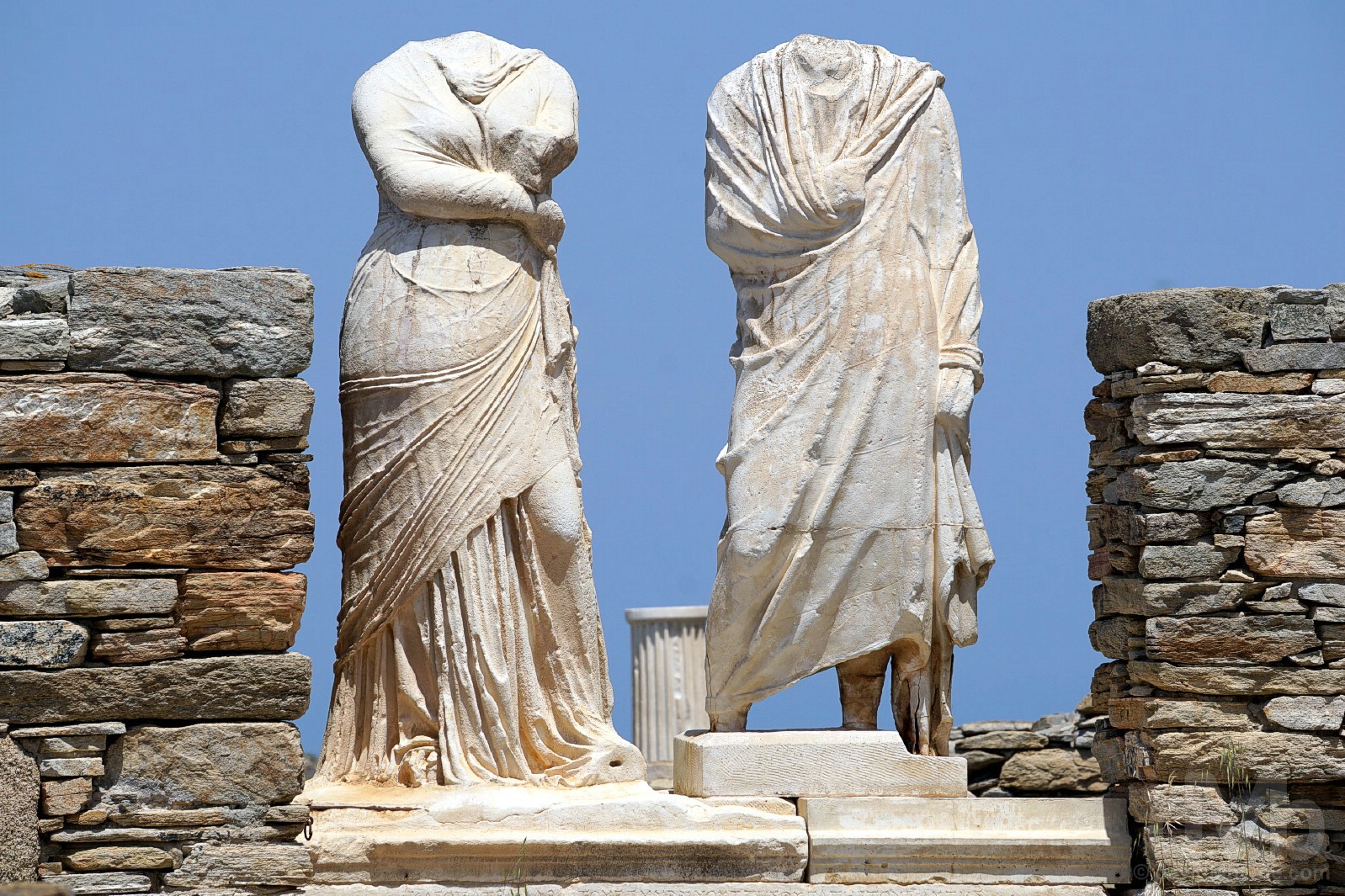
Headless statues of Cleopatra and Dioscorides in the House of Cleopatra of the Ancient Delos archaeological site, Delos, Cyclades, Greece. May 2, 2017.
Delos & The Cyclades
The Ancient Greeks named the archipelago Cyclades, meaning ‘encircling islands’ because they imagined the islands encircling the small sacred island of Delos; one of the holiest sanctuaries in Greek mythology, the island is the mythical birthplace of the gods Apollo and his twin sister Artemis. Today, the fascinating archaeological site on the island, one of the most important collections of ancient Greek ruins on earth, preserves the remains of a sanctuary to Apollo and Artemis and the once-magnificent city, a bustling commercial centre, that developed around it.
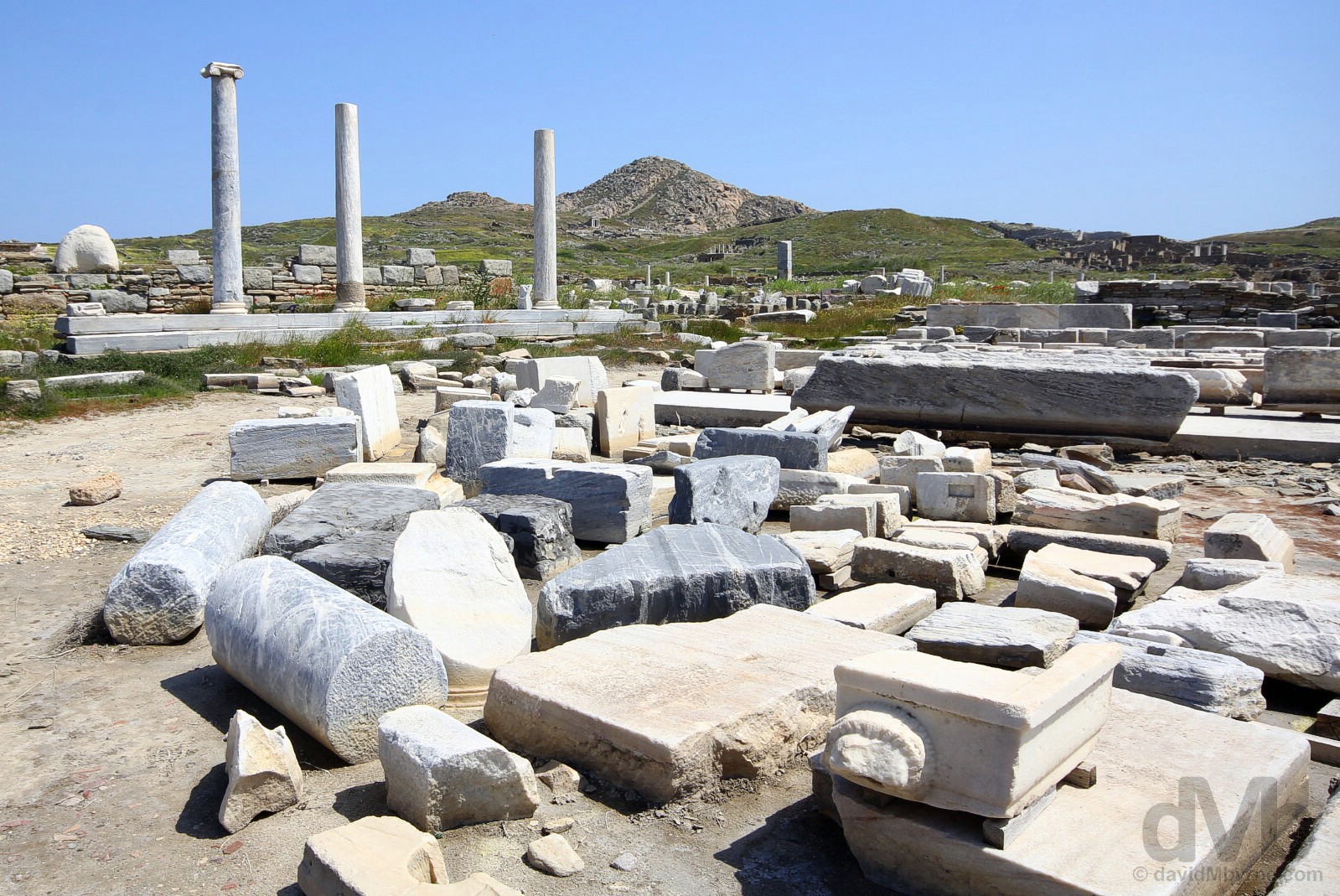
Archaeological cataloguing work ongoing near the Temple of the Delians of the Ancient Delos archaeological site, Delos, Cyclades, Greece. May 2, 2017.
Inhabited since around the 3rd millennium BC, Delos was well-established as a cult centre to Apollo and Artemis by c. 1000 BC. The island’s fortunes thereafter varied but it reached the peak of its prosperity under Roman rule in c. 100 BC, mostly off the back of slave trade, when the population of the tiny 3.43 km² island was estimated to be 25,000.
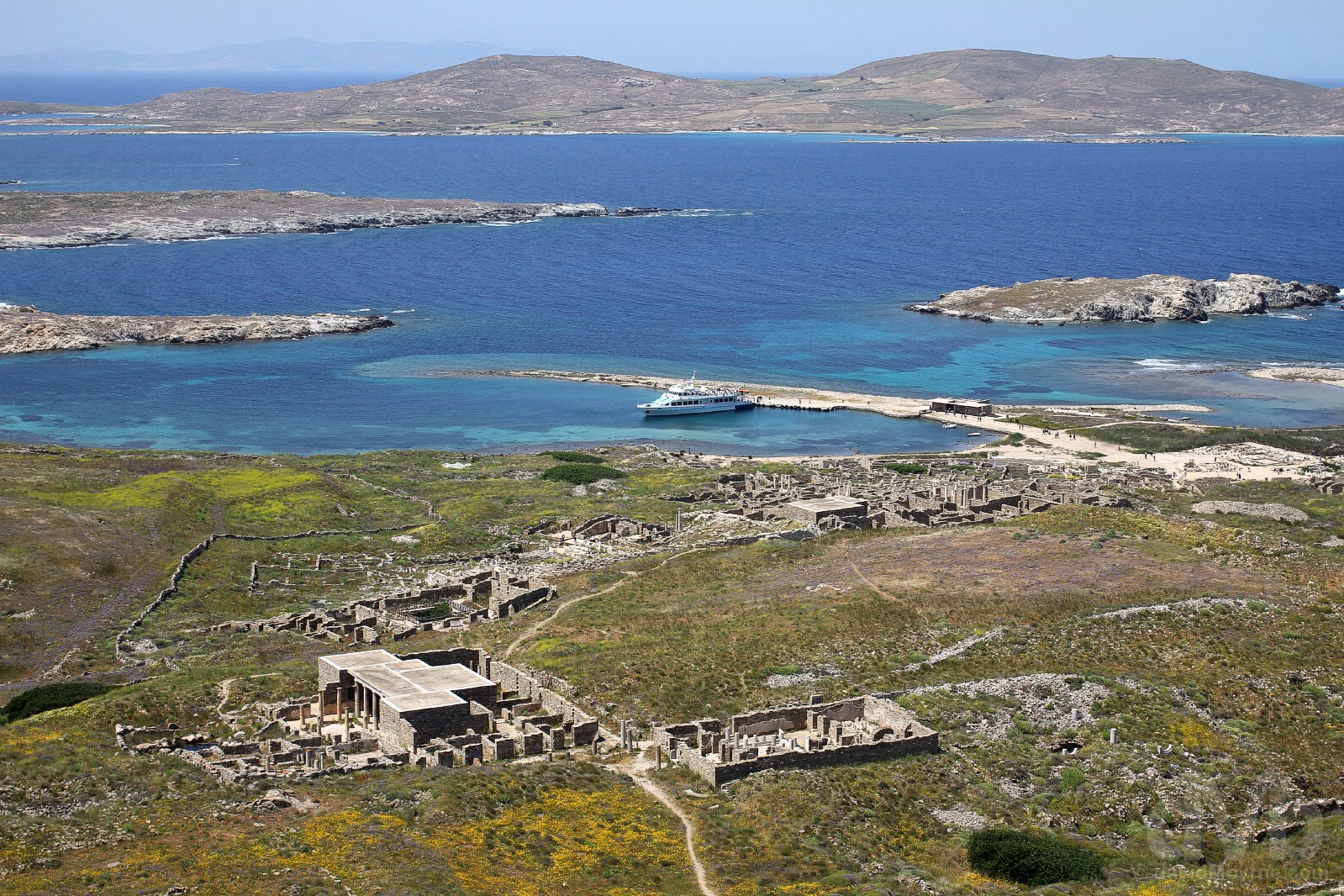
The island’s convenient location near the geographical centre of the Cyclades archipelago made Delos an ideal hub from which to conduct business. The sheltered Port of Delos, or Sacred Harbour, seen here from the path to the summit of Mount Kýnthos, the island’s highest point, was, stretching back to antiquity, the landing point for pilgrims, traders and slaves. Today it welcomes visitors who come to explore the open-air museum that is one of the ancient world’s most sacred spots.
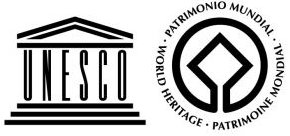 The favourable climate and the fact that the island remained uninhabited for the majority of the last 2 millennia means the site has aged well, the integrity of its remaining structures largely intact (most excavating today focuses on cataloguing the many pieces of ancient Greek artefacts that lay strewn all over the island and securing the site for the increasing volumes of tourists). For this reason, as well as the historical and archaeological significance of the site in antiquity, Delos was granted UNESCO World Heritage status in 1990, the only UNESCO-listed site in the whole history-heavy Cyclades region.
The favourable climate and the fact that the island remained uninhabited for the majority of the last 2 millennia means the site has aged well, the integrity of its remaining structures largely intact (most excavating today focuses on cataloguing the many pieces of ancient Greek artefacts that lay strewn all over the island and securing the site for the increasing volumes of tourists). For this reason, as well as the historical and archaeological significance of the site in antiquity, Delos was granted UNESCO World Heritage status in 1990, the only UNESCO-listed site in the whole history-heavy Cyclades region.
– UNESCO commenting on Delos
dMb Country Overview - Greece
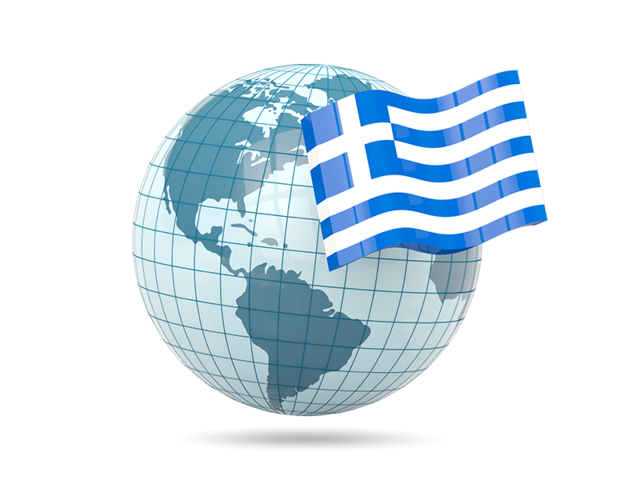 Greece
Greece
Region – Southeastern Europe/The Balkans (dMb tag: The Balkans). Capital – Athens. Population – 10.8 million. Official Language – Greek. Currency – Euro (€) GDP (nominal) per capita – US$21,000 Political System – Unitary parliamentary republic. EU Member? – Yes (10th member joined January 1981). UN Member? – Yes (founding member joined October 1945). G20 Member? – No. Size – 132,000 km² (Europe’s 15th largest country is approximately half the size of Ecuador, twice the size of Sri Lanka, and roughly the same size as the US southern states of Alabama and Louisiana. Topography – A mountainous interior (80% of Greece is mountainous), a long and convoluted coastline, and hundreds of offshore islands. Independence – 1830 from the Ottoman Empire following 1821 to 1830 Greek War of Independence. Brief History – From the eighth century BC, the Greeks were organised into various independent city-states, known as poleis (singular polis), which spanned the entire Mediterranean region and the Black Sea. Philip of Macedon united most of the Greek mainland in the fourth century BC, with his son Alexander the Great rapidly conquering much of the ancient world, from the eastern Mediterranean to India. Greece was annexed by Rome in the second century BC, becoming an integral part of the Roman Empire and its successor, the Byzantine Empire, which adopted the Greek language and culture. The Greek Orthodox Church, which emerged in the first century AD, helped shape modern Greek identity and transmitted Greek traditions to the wider Orthodox World. After falling under Ottoman dominion in the mid-15th century, Greece emerged as a modern nation state in 1830 following a war of independence. UNESCO World Heritage sites – 18. Tourism Catchphrase/Slogan – All Time Classic. Famous For – Endless coastline and beaches; shipping; democracy (born here); a classical and hallowed past; ouzo; sun-drenched islands; Alexander the Great; the Olympics; being the cradle of Western civilisation; food (tzatziki, feta, souvlaki, moussakas, yogurt, grapes, olives and olive oil); economic collapse & austerity.

Ouzo for sale in the village of Oia, Santoríni, Cyclades, Greece.

Ouzo for sale in the village of Oia, Santoríni, Cyclades, Greece.
Highlights – Cyclades island-hopping and the remnants of all that ancient history (Greece boasts four millennia of sun-bleached ruins, artefacts, and architecture). Greece Titbits – At nearly 14,000 km (8,500 miles), Greece has the 11th longest coastline in the world; Greece is considered the cradle of Western civilisation, being the birthplace of democracy, Western philosophy, Western literature, historiography, political science, major scientific and mathematical principles, Western drama, and the Olympic Games (the country’s rich historical legacy is reflected in part by its 18 UNESCO World Heritage Sites, as of 2017); the Greek economy is the largest in the region with an economy larger than all other Balkan countries combined, this despite its well-documented economic battering and subsequent austerity measures.
Visits – 2 (May 2008 and April/May 2017). Where I Went/What I Saw – Thessaloniki; The Cyclades (Santoríni, Paros, Mykonos, Delos, Tinos); Zakynthos/Zante; Olympia; Sparta; Mystras; Athens.
It doesn’t take long to amble through the various regions of the exposed and hilly Delos site; various colour-coded routes to follow depending on the time and energy levels at your disposal are outlined in the official site pamphlet. Most embark on a counterclockwise loop from the port through the so-called Residential and Theatre Quarters to the summit of Mount Kýnthos before heading for the Archaeological Museum of Delos followed by the Sacred Lake and Terrace of the Lions region. By doing so I easily passed a few early May morning hours before returning whence I came to the relative hustle and bustle of neighbouring Mýkonos.
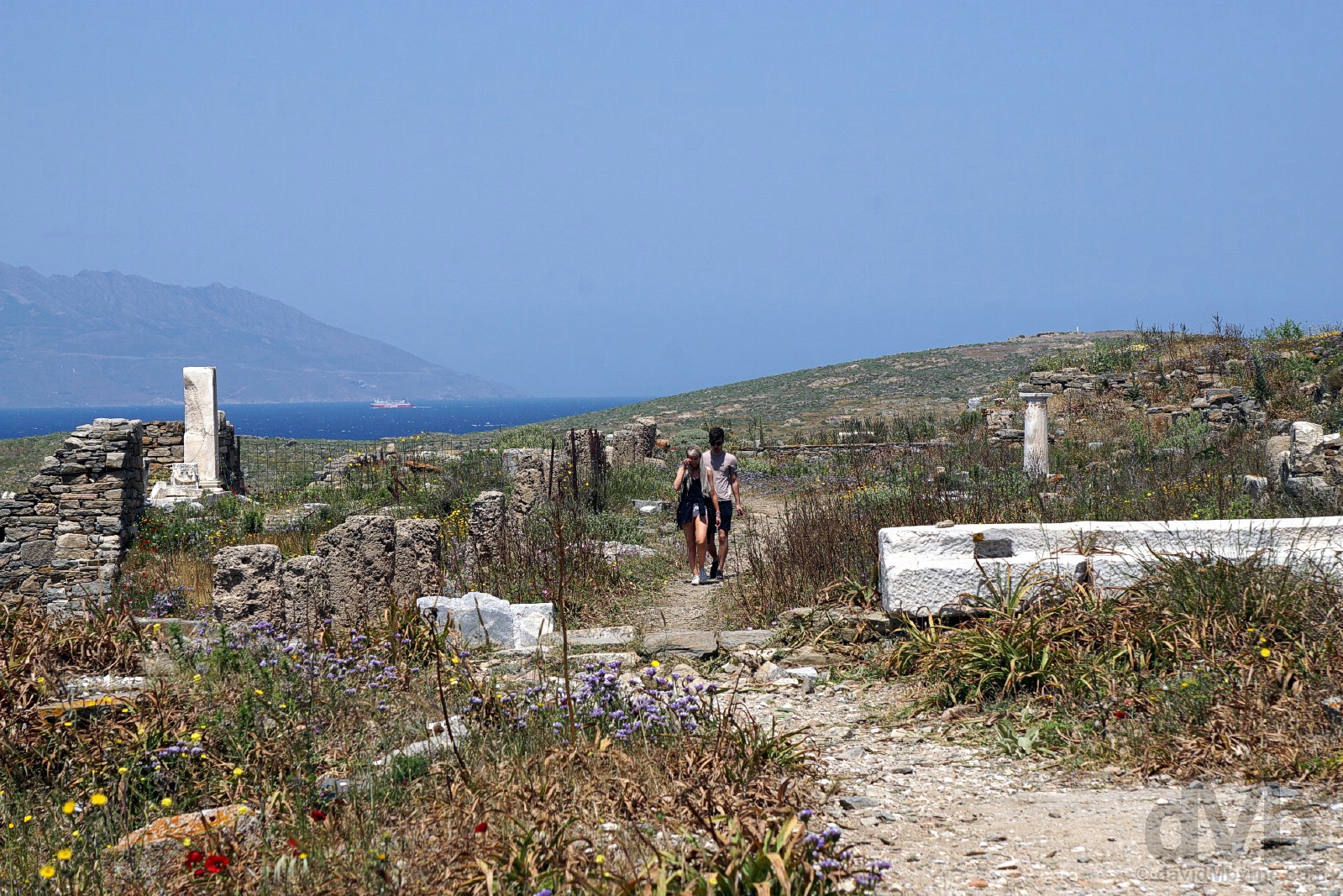
Exploring the Ancient Delos archaeological site, Delos, Cyclades, Greece. May 2, 2017.
The Residential and Theatre Quarter is where Delos’ wealthiest inhabitants lived and socialised. A lot of their impressive villas and mansions were built in a peristyle design which boasted intricate and colourful mosaics, artistically the central feature of the abode and after which the remaining structures are now named.
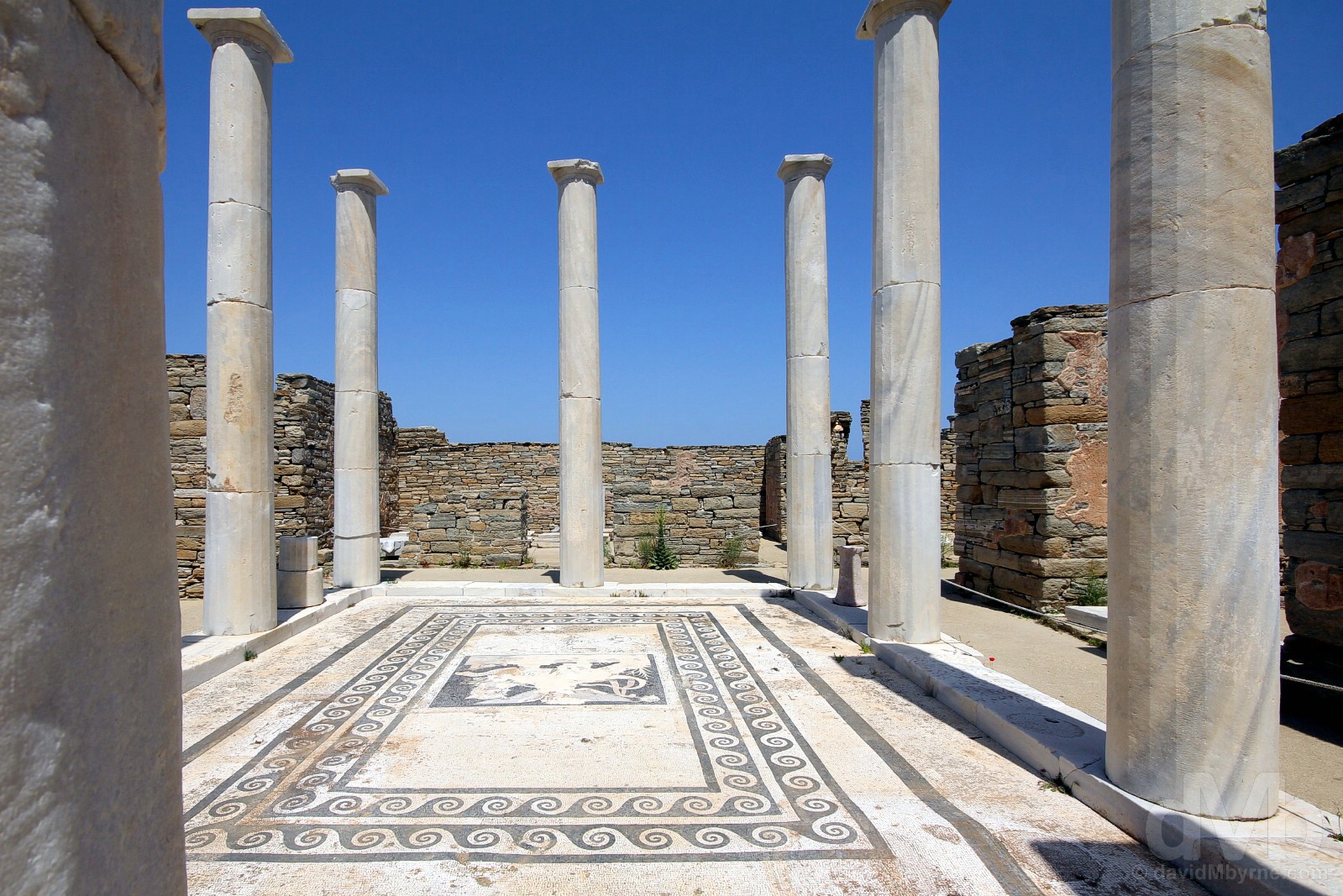
HOUSE OF DIONYSUS |The remaining columns and central floor mosaic in the House of Dionysus, Ancient Delos archaeological site, Delos, Cyclades, Greece. May 2, 2017.
The stunning mosaic of the central courtyard of the House of Dionysus, the remains of a lavish villa, depicts Dionysus, the Greek god of many things (theatre/drama, vegetation, fertility) but mostly indulgences, the kinds of which (wine, pleasure, festivity, madness, wild frenzy) single Dionysus out as a likeable kind of Greek deity. There’s a replica of the mosaic, showing a winged Dionysus astride a tiger, on display here – the original, like most of the original Ancient Delos artefacts, is on display and safe from the elements in the on-site museum (see below picture). With the exception of the site’s nearby House of Dolphins, the House of Dionysus is unique among peristyle (where colonnades surround a building or enclose a courtyard) homes in Delos in featuring a figured scene – all other courtyards of peristyle homes in Ancient Delos featured floral and geometric mosaics.
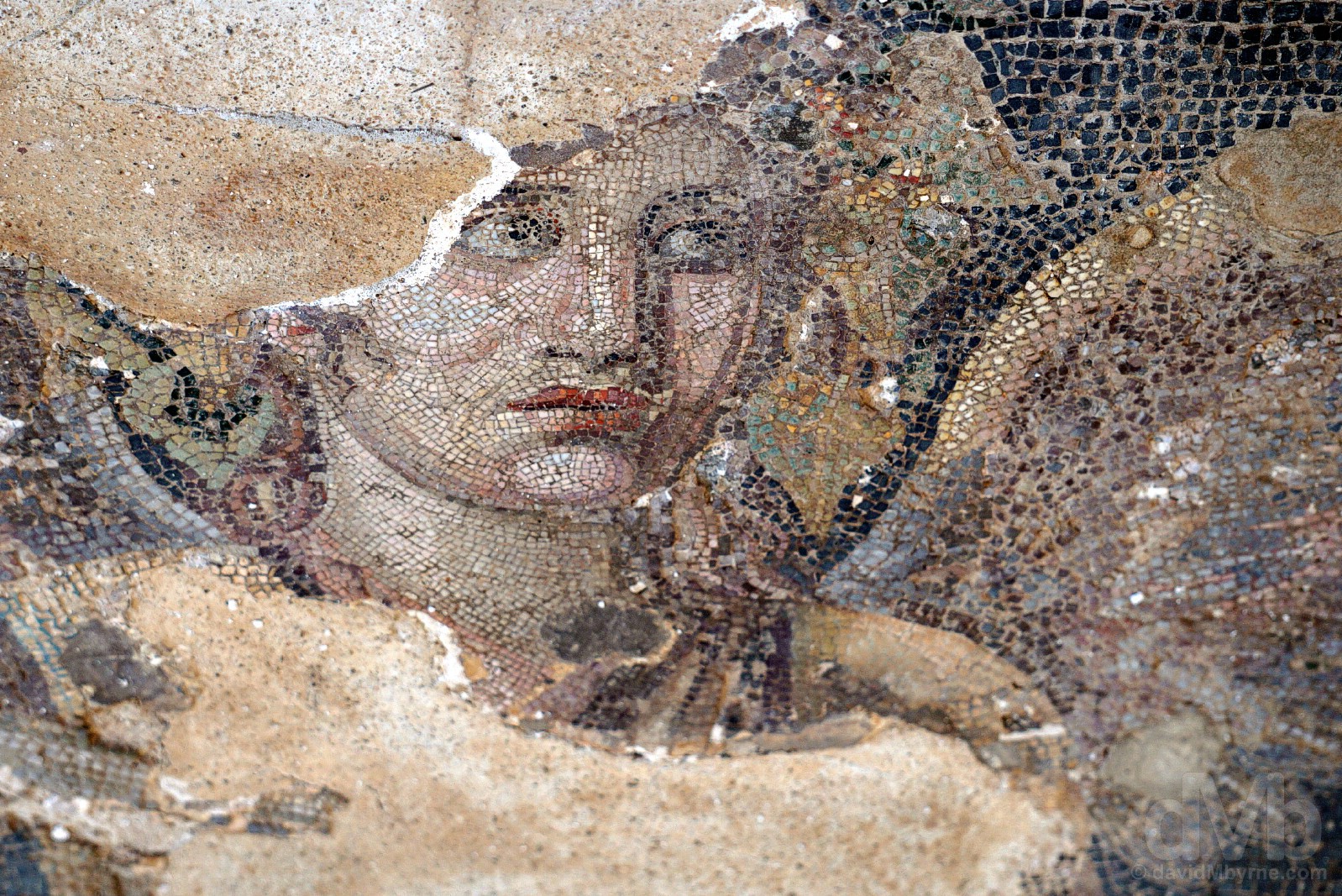
DELOS MOSAICS |The face of Dionysus depicted on the original mosaic from the House of Dionysus on display in the on-site Archaeological Museum of Delos, Delos, Cyclades, Greece. May 2, 2017.
Much like a lot of the mosaic work on display throughout the Delos site (which also boasts a fine collection of frescos), the mosaic from the courtyard of the House of Dionysus exhibits some stunningly intricate work – the tesserae of glass, faience, terracotta, and natural stone range in size from 1/2 mm to 1 mm. The work has been dated to c. 125 BC, dating it to the classical Greek Hellenistic period. Collectively the mosaics of Delos are a significant body of ancient Greek mosaic art. Indeed, approximately half of all surviving tessellated Greek mosaics from the Hellenistic period come from Delos.

HOUSE OF CLEOPATRA | The House of Cleopatra of the Ancient Delos archaeological site, Delos, Cyclades, Greece. May 2, 2017.
A floor outline (showing 12 rooms arranged around 2 open courtyards, typical for the larger homes of the settlement’s Theatre Quarter), a few Doric columns, and a pair headless but still photogenic statues are all that remains of the House of Cleopatra. The replica statues (again the originals are on display in the on-site Archaeological Museum of Delos) are of the villa’s former owners Cleopatra and Dioscorides, a wealthy Athenian couple of high standing in Delos – this Cleopatra, a name of Greek origin, lived a century (c. 130 BC) prior to the beautiful, charismatic, and eminently more famous Egyptian Queen (69-30 BC) of the same name. The placement of the statues within the house gives an insight into residential life on Delos during the 2nd century BC – they may have been placed for maximum visibility from the streets outside, for the pleasure of their owners, or for impact on visitors to the household. Purposefully impactful then and still purposefully impactful today.
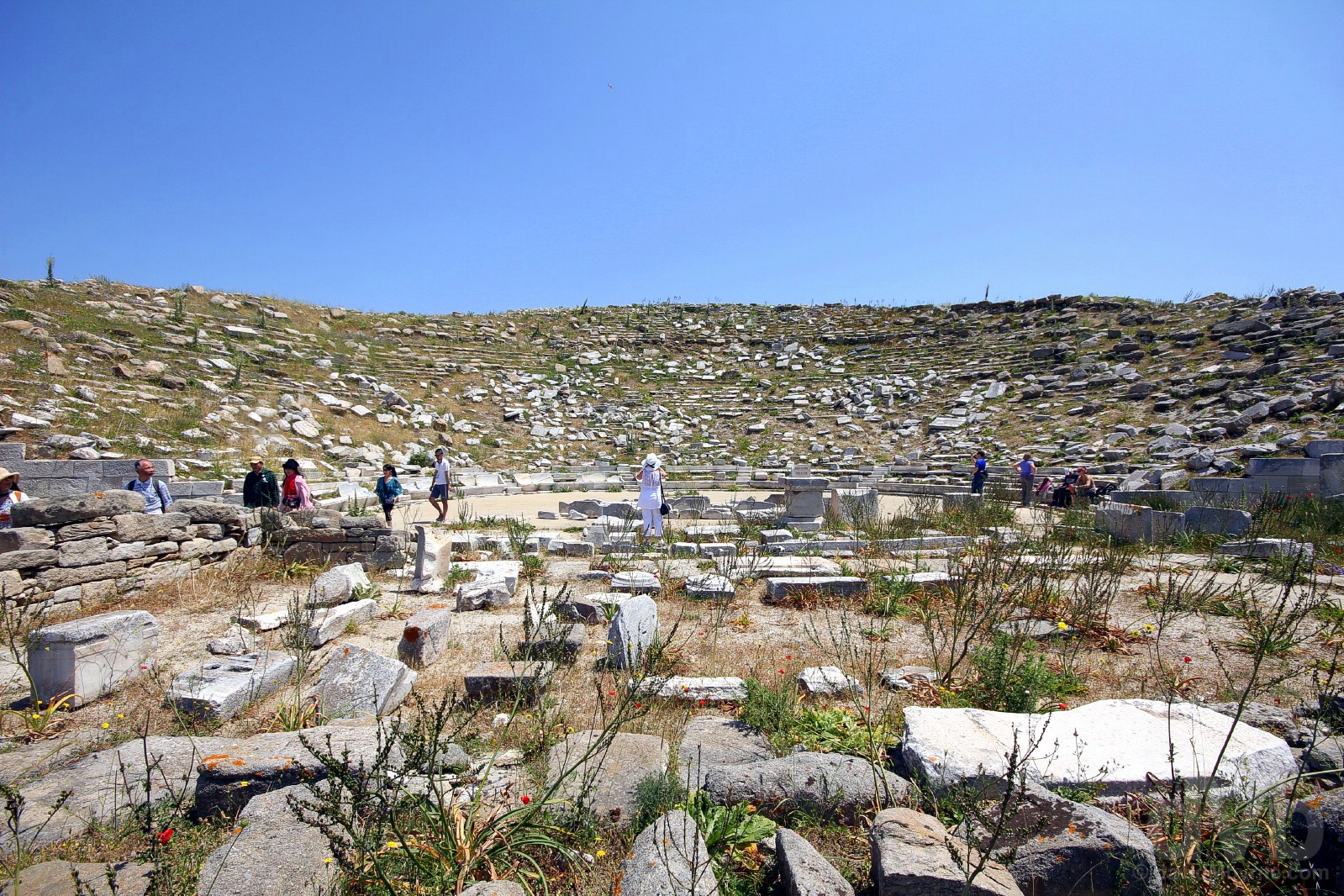
ANCIENT THEATRE | The Ancient Theatre of the Ancient Delos archaeological site, Delos, Cyclades, Greece. May 2, 2017.
Built between 296 and 240 BC and seemingly partially restored, the Delos Theatre was an essential part of cultural life on the island. The scene today at the theatre, whose bowl-shaped amphitheatre form is unmistakable, is one littered with countless fractured pieces of ancient marble, comparable in number, maybe, to the 5,000-plus spectators the space was able to accommodate in antiquity.
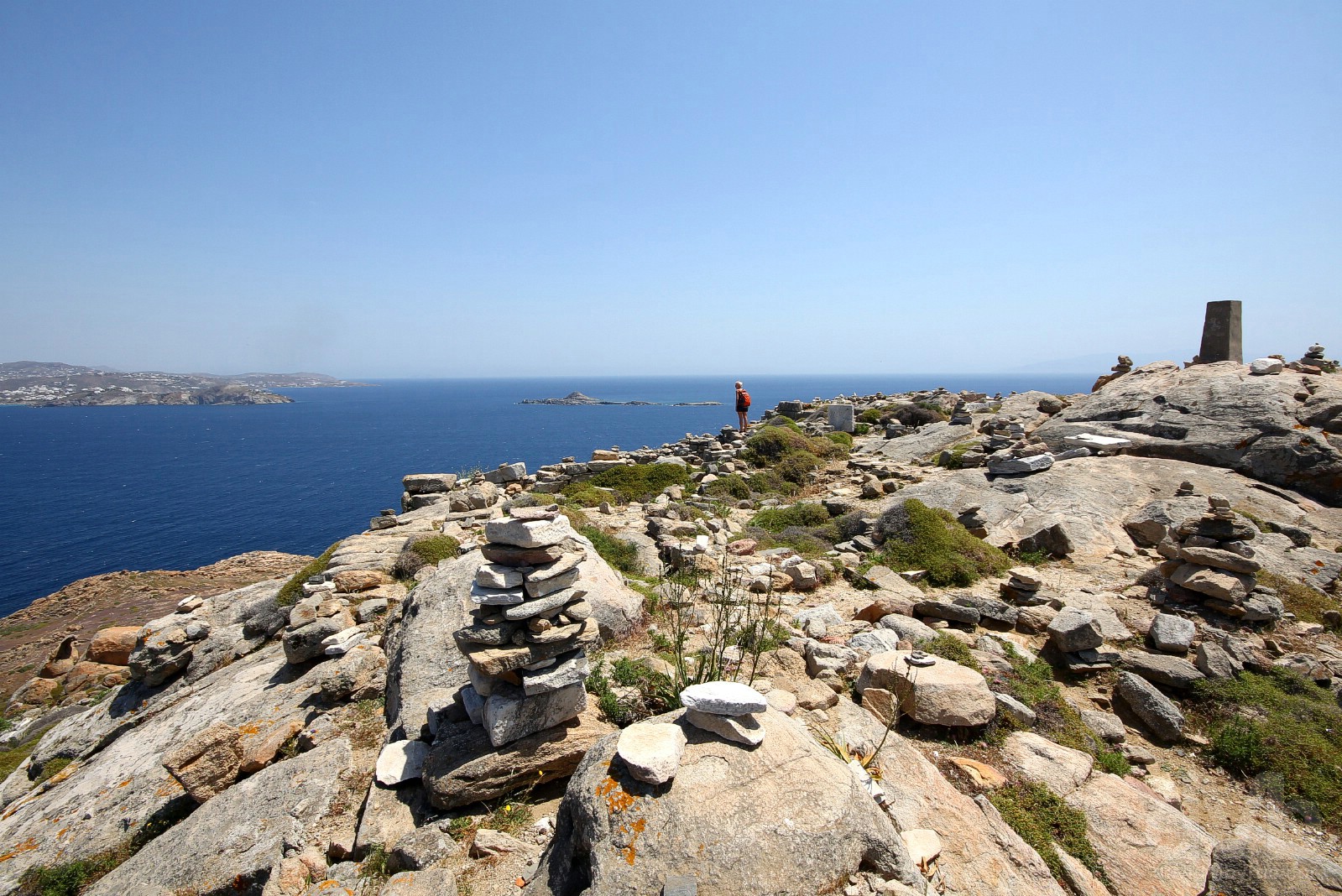
MOUNT KYNTHOS | Completing the circle. Surveying the surrounding Cyclades from the summit of Mount Kynthos of the Ancient Delos archaeological site, Delos, Cyclades, Greece. May 2, 2017.
It’s always exposed and sometimes steep but it’s not a long trek from the Ancient Theatre to the 113-metre summit of Delos’ bare granite Mount Kýnthos. Easily the island’s prominent geographical feature, it was believed to have served as the acropolis of the ancient town and it is postulated that it was once surrounded by a wall. Compared to the rest of the Ancient Delos site, there’s nothing of historical note to see on the summit, although there are foundations and remains of a large building of the Ionic order. It’s the vistas that people trek up here for these days – the highest point on the island, Mount Kýnthos offers sweeping views not only down over the Delos site but also further afield to the surrounding Cyclades isles (Mýkonos, and from where most excursions to Delos originate, can be seen to the left of the image across a short stretch of azure Aegean Sea).

DELOS ISLAND | An overview of the Ancient Delos archaeological site as seen from the summit of the island’s Mount Kynthos. Delos, Cyclades, Greece. May 2, 2017.
Delos lsland is small – no more than 5 km long and 1.3 km wide, it occupies a space of only some 3.4 km². This would have been a busy settlement at its height when it sustained a population of 25,000-plus, especially when you consider that the ancient town was mostly concentrated on the flat and sometimes marshy west coast of the island, seen here from the summit of Mount Kýnthos. Today the island is closed to the public and only accessible to paying tourists who come here to explore the surviving the protected structures and artefacts of Ancient Delos, the latter of which are now mostly housed in the on-site museum, the Archaeological Museum of Delos (the square building seen here to the right of centre).
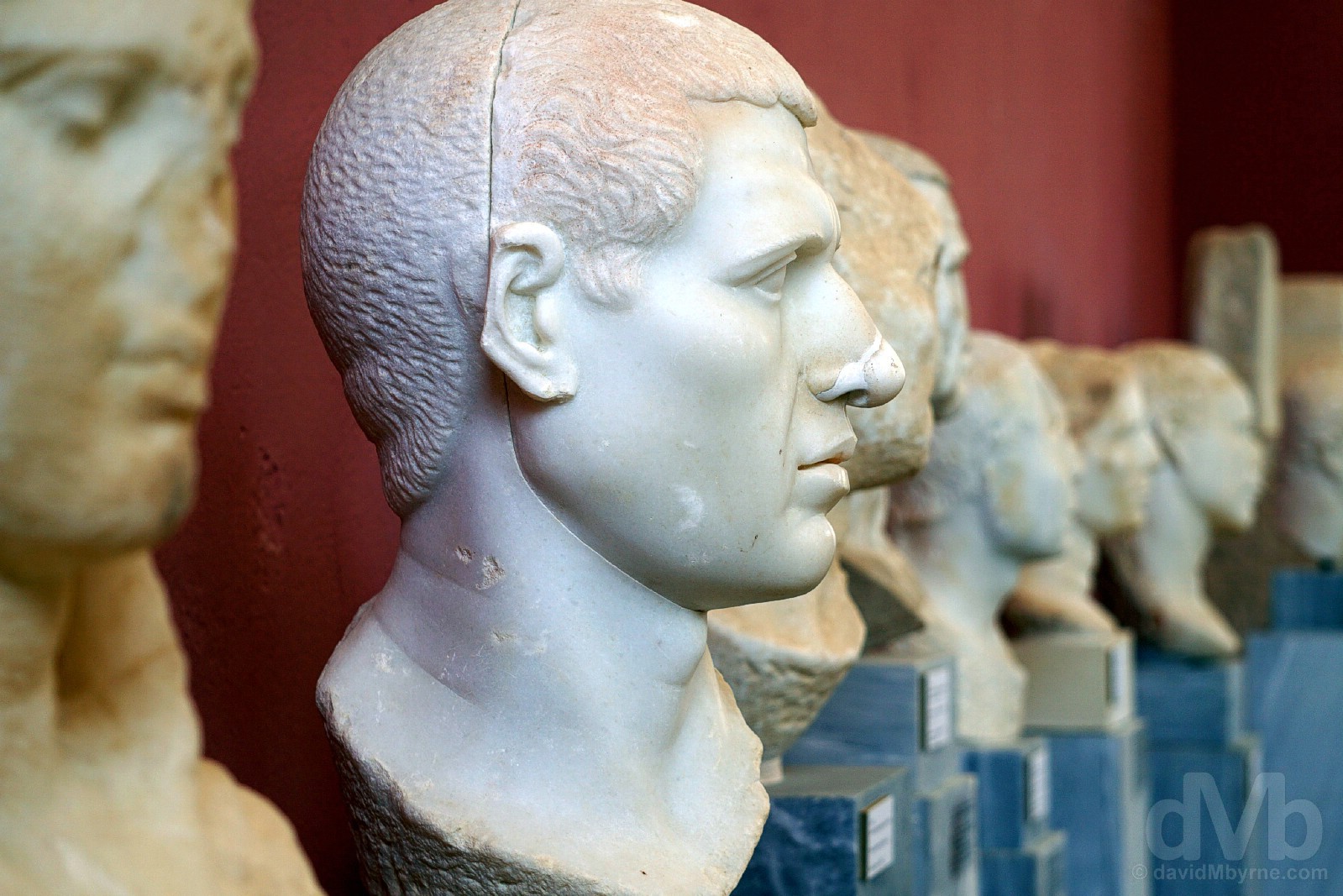
ARCHAEOLOGICAL MUSEUM | On display in the on-site Archaeological Museum of Delos, Delos, Cyclades, Greece. May 2, 2017.
Displaying artefacts from the Archaic, Classical, Hellenistic and Roman periods of occupation on Delos, the boxy and architecturally uninspiring on-site Archaeological Museum of Delos was built in 1903 (and in parts it looks like it has been left to crumble ever since, maybe in a bid to mirror the surrounding antiquity). While many significant finds from Delos were carted away to the National Archaeological Museum in Athens, this small 9-room museum still boasts many of the original frescoes, mosaics, and statues that were removed from the structures of Delos and subsequently replaced with you-would-never-know replicas. Some of the displays are a little haphazard and the accompanying text hard to decipher (not to mention outdated – I read text highlighting new display unveilings scheduled for 2000), but one never loses sight of the fact that this is one of the finest collections of ancient Greek sculpture to be found anywhere on earth, a collection that gives a fascinating insight into the daily lives of the ancient inhabitants of the island of Delos.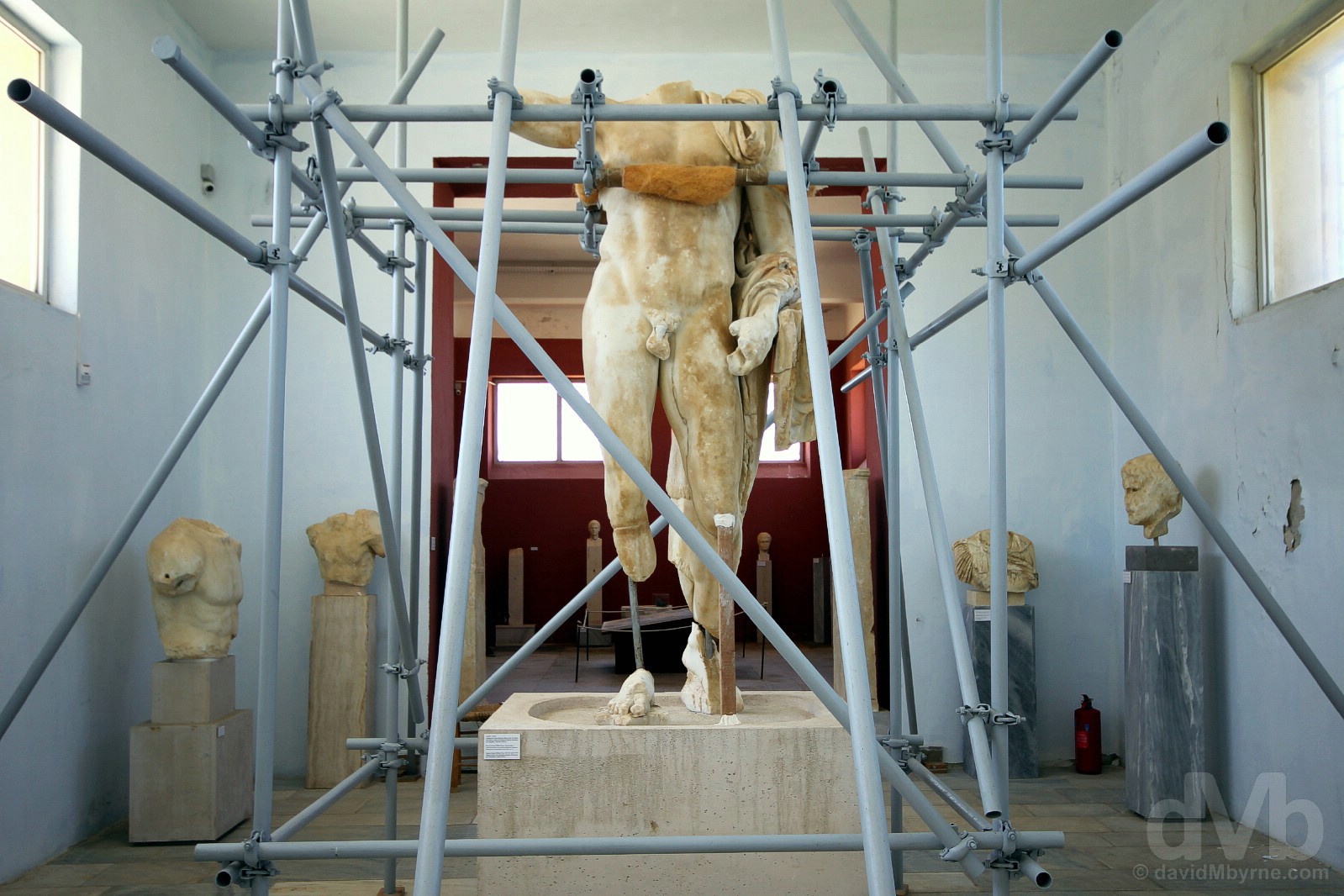
GAIUS OFELLIUS FERUS STATUE | The Statue of Gaius Ofellius Ferus on display in the on-site Archaeological Museum of Delos, Delos, Cyclades, Greece. May 2, 2017.
Attention-grabbing thanks to its supporting mesh of scaffolding, the museum’s marble Statue of Gaius Ofellius Ferus is believed to date to 100 BC and was recovered from the site’s huge Agora of the Italians, early Roman-era ruins of a columned court used by Italian merchants.
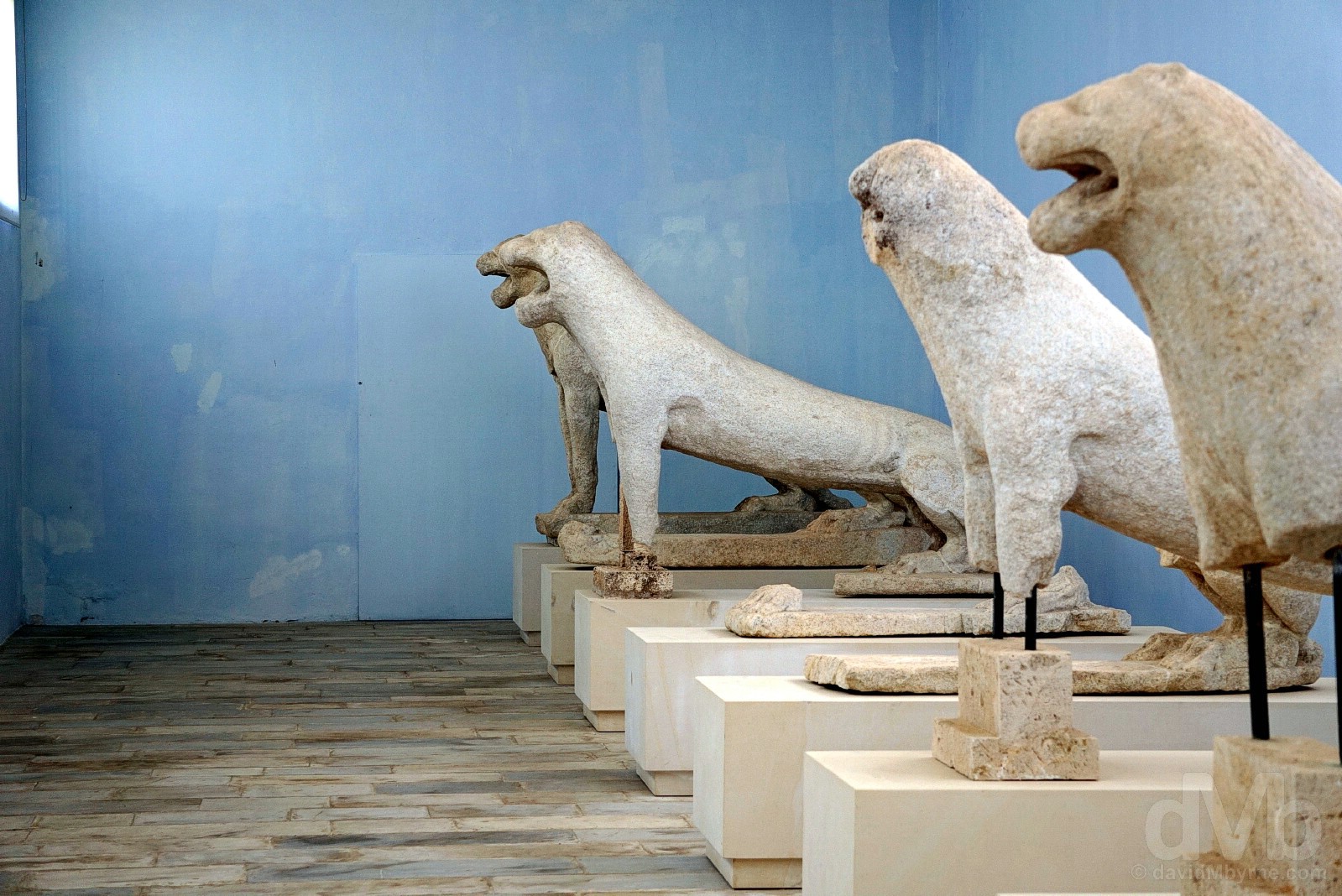
TERRACE LIONS | The original lions from the Ancient Delos Terrace of the Lions on display in the on-site Archaeological Museum of Delos, Delos, Cyclades, Greece. May 2, 2017.
Probably the star of the Delos show and thus commandeering a museum room unto themselves, the original marble lions from the Delos Terrace of the Lions were sculpted as far back as the 7th century BC (some claim it to be the 6th century BC, but either way these pieces are old) and were presented to Delos as offerings from the people of the Cyclades island of Naxos (as part of a building project designed to display to the rest of the Ancient Greek world the undisputable supremacy of the Naxians). The actual number of lions given to the island by the Naxians is unknown (it is estimated to be anywhere from between 9 and 19) but at least three have known to have disappeared and one was looted by Venetians in the 7th century (it presently adorns the Arsenale in Venice). These are the remaining originals, having been relocated here from their perch guarding the site’s Sacred Lake, although only as recently as October 1999. Undoubtedly an impressive sight, and while their form may be eternal, they are heavily eroded showing evidence of having spent over 2-and-a-half millennia outdoors.
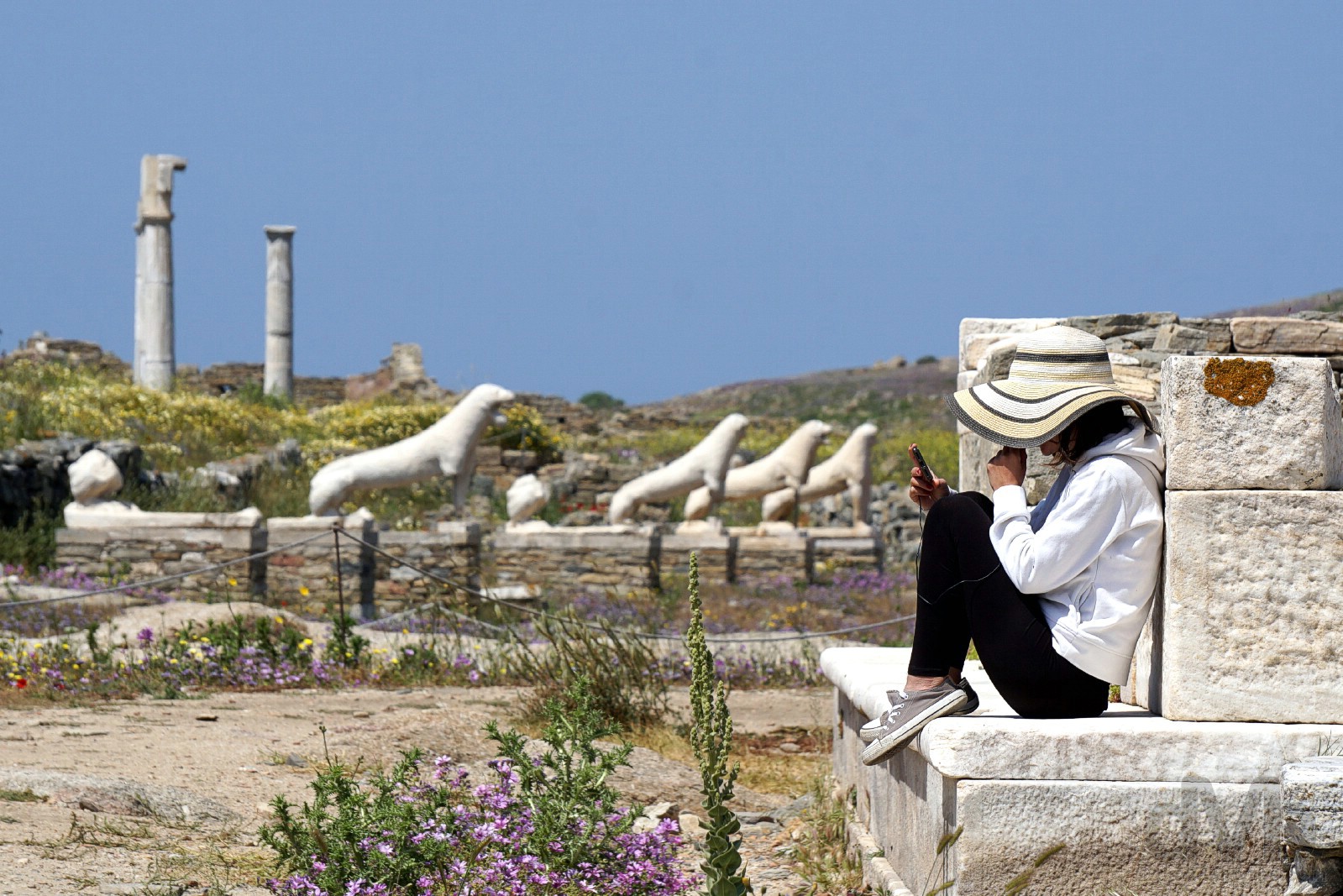
TERRACE OF THE LIONS | A site supervisor near the Terrace of the Lions of the Ancient Delos archaeological site, Delos, Cyclades, Greece. May 2, 2017.
The original lions of Delos were placed on the natural Terrace of the Lions guarding the site’s Sacred Lake where mythology states is the birthplace of Apollo and Artemis (sacred or no, the lake was drained in 1929 to prevent the spread of malaria and today a nondescript circular wall marks where it used to be). The lions, seated on their haunches and with their mouths open in eternal roar, were strategically placed on a busy road with the intention of warding off intruders by inspiring divine fear in a populous that had probably never before seen a lion. Today the passage is a little quieter with less chance of looting, so much so that those entrusted with supervising the terrace and its replica lions can pass the time of day on their smartphones.

Spring has well since sprung in early May, a beautiful time of the year to visit Delos. Catalogued marble columns among the spring foliage of the Ancient Delos archaeological site, Delos, Cyclades, Greece. May 2, 2017.
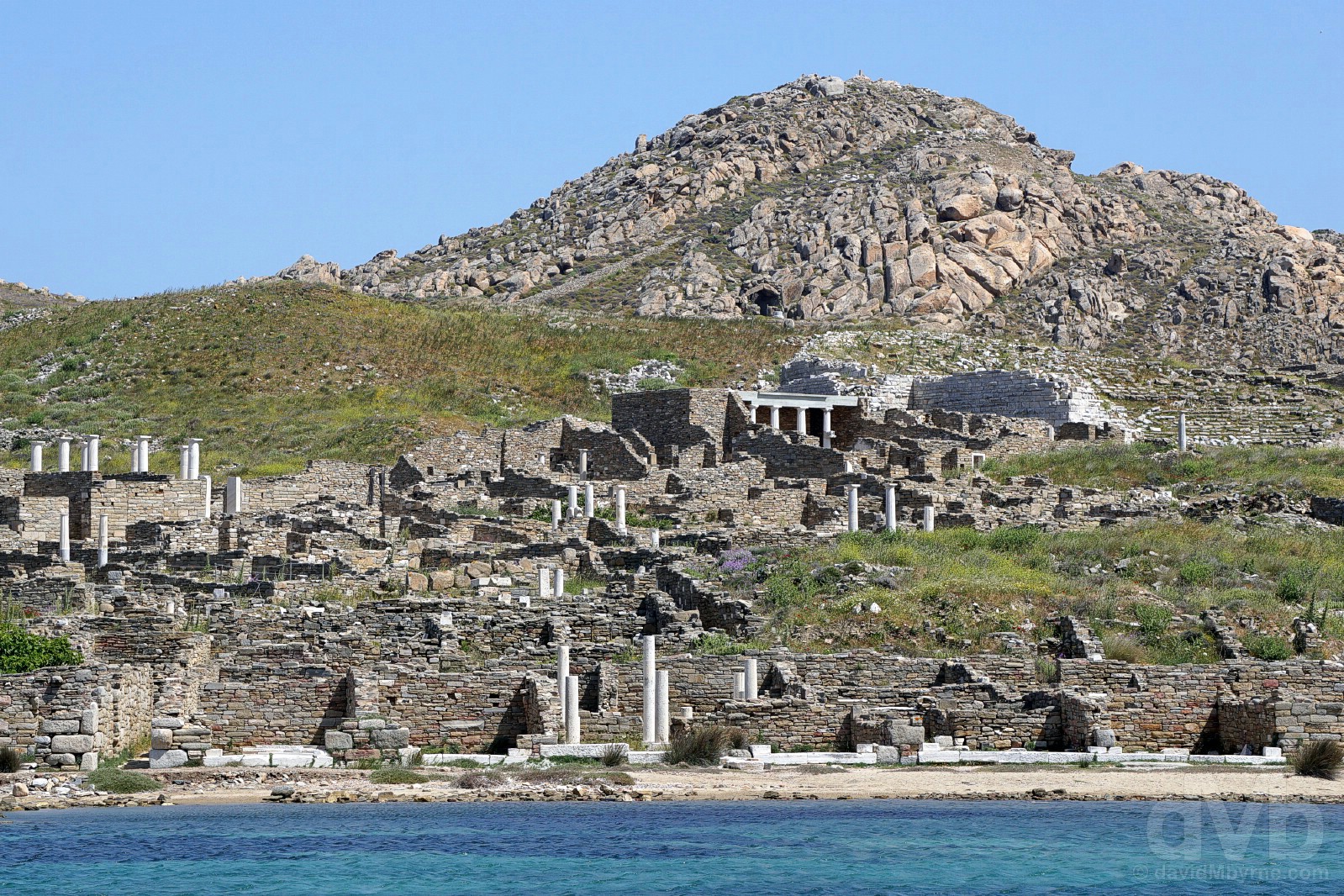
A parting shot, Mount Kýnthos and the Residential and Theatre Quarters of the Ancient Delos archaeological site as seen from the waters of the Port of Delos en route back to Mýkonos. Delos, Cyclades, Greece. May 2, 2017.
Signing Off | The Complete Delos Gallery
